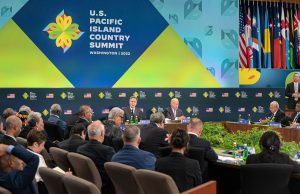Solomon Islands agreed to sign an accord between the United States and more than a dozen Pacific nations only after indirect references to China were removed, the Solomon Islands foreign minister said Tuesday.
“There were some references that put us in a position where we’ll have to choose sides, and we did not want to be placed in a position where we have to choose sides,” Jeremiah Manele told reporters in Wellington.
His remarks represented the first time Solomon Islands has publicly acknowledged it had initial concerns about the agreement and expressed why it had a change of heart.
The accord was signed in Washington last week, with U.S. President Joe Biden telling visiting Pacific leaders that the United States was committed to bolstering its presence in the region and becoming a more collaborative partner.
The administration pledged the U.S. would add $810 million in new aid for Pacific Island nations over the next decade. The summit came amid growing U.S. concern about China’s military and economic influence in the Pacific.
But the final agreement focused mainly on issues like climate change, economic growth, and natural disasters. A small section on security contained mostly broad language, and while it specifically condemned Russia’s invasion of Ukraine, it made no mention of China.
Ahead of the summit, diplomats had said Solomon Islands was signaling it was unlikely to sign the joint declaration, which would have represented a diplomatic blow for both the U.S. and the Pacific nations.
Many in the U.S. and the Pacific had been eager to get Solomon Islands on board after becoming alarmed about the increasing ties between Solomon Islands and China, especially after the two nations signed a security agreement earlier this year.
“In the initial draft, there were some references that we were not comfortable with, but then with the officials, after discussions and negotiations, we were able to find common ground,” Manele said.
Pressed further by reporters on those concerns, Manele acknowledged the draft had contained indirect references to China.
He said Solomon Islands’ security agreement with China was part of a national security strategy and there was no provision in it for China to build a military base, as some had feared.
Meanwhile, in a report released Wednesday, researchers at the Australian Strategic Policy Institute think tank said the Chinese Communist Party has attempted to undermine Solomon Islands’ relationship with Australia and the U.S. by spreading false narratives through local and social media networks in Solomon Islands.
The authors said they collected data from after riots that occurred in the capital last November and again after details of the security agreement with China were leaked in March and found the Communist Party used Facebook groups along with certain journalists and decision-makers to push its message. The authors said one false narrative pushed by the party was that Australia, the United States, and Taiwan had instigated the riots and fomented unrest in the nation.
Manele met with his New Zealand counterpart, Nanaia Mahuta, in Wellington at a potentially awkward venue — Parliament’s Rainbow Room, which is dedicated to the nation’s gay, lesbian, and transgender communities. The room features photographs of LGBTQ lawmakers and framed copies of bills relevant to those communities.
In Solomon Islands, gay and lesbian sex remain illegal.
Manele said Solomon Islands was a young democracy.
“These are emerging issues. These are challenges that as a young country we will find ways to discuss,” he said.
Mahuta said there was no undertone or message intended in the choice of location. “It was the only available room for us to use,” she said.

































